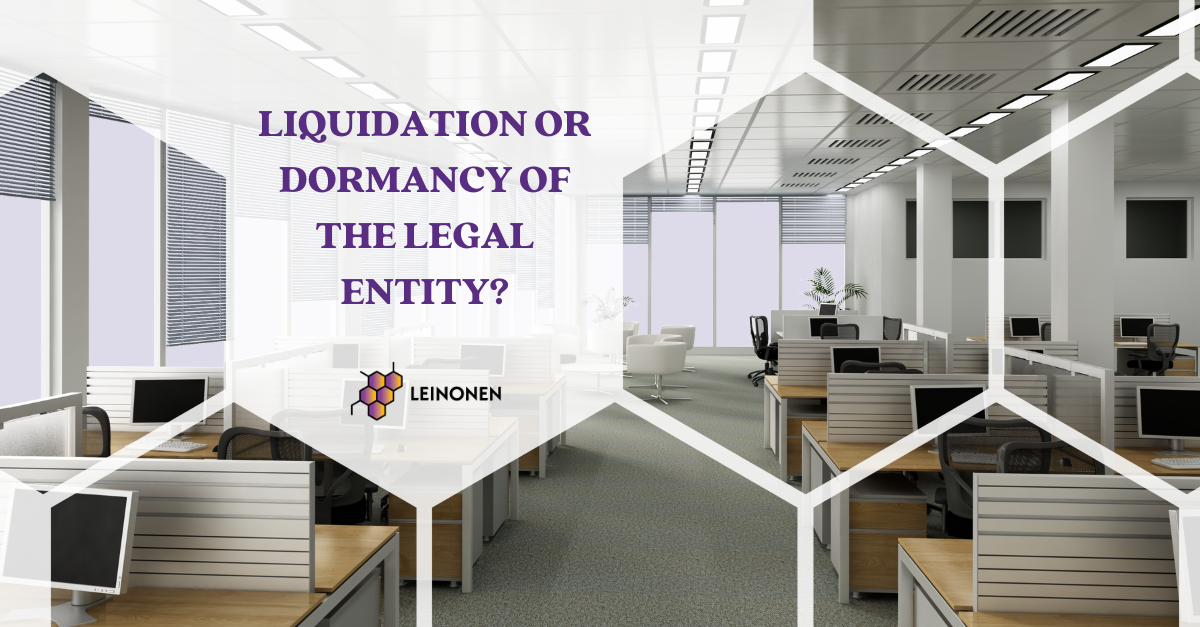In the constantly changing business world, it is sometimes needed not only to expand business activities, but also to suspend them or even to liquidate the legal person. In such cases, the question arises whether it is better to choose the liquidation of a legal entity or only a temporary suspension of activities.
In order to determine the most appropriate choice, Leinonen lawyers will review the specifics of liquidation and suspension of operations procedures. In this way, we will help you to make the most suitable decision.
Liquidation in Lithuania
The liquidation process starts with the initiation of the liquidation by adopting of the resolution to liquidate the legal entity and to appoint the liquidator.
Upon his election, the liquidator shall assume the rights and duties of the legal entity’s Manager and the Board.
The following steps:
- Commencing the liquidation process by preparing of an opening liquidation balance sheet.
- Terminating all contracts, encompassing employment agreements.
- Submitting a formal notification to the Register Center elucidating the legal entity’s status as “in liquidation process”.
- Issuing public notifications to creditors, formally apprising them of the imminent termination of the legal entity’s activities.
- Performing a comprehensive review of valid contracts is undertaken and preparation of the list of assets to transfer to the shareholder(s).
- The transference of assets from the legal entity to the identified shareholder(s) is executed in accordance with the compiled list.
- The preparation of the final balance sheet and requisite tax forms. Subsequent submission to the Tax Authorities.
- The formal closure of the legal entity’s bank account(s) is performed.
- Arranging archive works and submitting documents of the legal entity to the Municipality Archive for further storage.
- Destroying the legal entity’s stamp (if issued).
- The formalization of the liquidation process by preparing the Liquidation Act, encapsulating the procedural chronology and conclusive outcomes of the dissolution.
- The submission of all requisite documents to the Register Center for the final de-registration of the legal entity.
Dormancy in Lithuania
The first step is for the shareholder(s) of the legal entity to adopt a formal decision to suspend the legal entity’s activities.
The following steps:
- Within 5 working days of the decision, the shareholder is obligated to notify the State Tax Inspectorate about the suspension and specify the intended duration of dormancy. The maximum period for dormancy is 5 years.
- All financial obligations towards creditors, employees, and third parties must be settled comprehensively before suspending activities.
- Valid employment contracts, including that of the legal entity’s head, must be formally terminated.
- All contracts with vendors/suppliers must be formally terminated for the duration of dormancy, preventing the legal entity from receiving invoices.
- Despite dormancy, the legal entity is obligated to approve and submit financial statements to the Lithuanian Register Center annually.
- The bank account(s) may be closed, but this step is not mandatory. Bank charges may still apply if the legal entity maintains an open bank account during dormancy.
- Declarations for the State Tax Inspectorate shall be submitted for the current year if the activity is suspended in the middle of the year.
After the suspension of activities, the legal entity is prohibited from purchasing goods or raw materials, entering into contracts, paying invoices, and generating income.
Upon deciding to resume operations, responsible persons of the legal entity would be required to notify the State Tax Inspectorate within 5 working days about the resumption of activities.
Comparison between Liquidation and Dormancy in Lithuania
| Steps | Liquidation | Dormancy |
|---|---|---|
| Initiation process | Initiated by adopting a resolution to liquidate the legal entity and appoint a liquidator. | Initiated by the shareholder(s) adopting a formal decision to suspend the legal entity’s activities. |
| Legal Implications | Results in the dissolution of the legal entity and the cessation of its existence. | Allows the legal entity to maintain legal existence, preserving the option to resume operations in the future. |
| Duration | Permanent dissolution. | Limited to a maximum period of 5 years. |
| Financial Obligations | Requires settling all financial obligations comprehensively before proceeding. | Similarly necessitates settling all financial obligations before suspension. |
| Termination of Contracts | Involves terminating all contracts, including employment agreements. | Requires termination of valid employment contracts and termination of all other contracts similar to liquidation process. |
| Reporting Obligations | Involves public notifications to creditors, notifying the Register Center, and submitting financial statements during the process. | Requires notifying the State Tax Inspectorate about suspension of company’s activities, submitting annual financial statements to the Register Center each year. |
| Restrictions on Activities | Legal entity ceases all business activities, contracts, and financial transactions. | Prohibits the legal entity from purchasing goods, entering contracts, paying invoices, and generating income during the dormancy period. |
| Resumption Process | Does not allow for a direct resumption, a new entity would have to be established. | Permits the resumption of operations after notifying the State Tax Inspectorate 5 working days in advance. |
| Assets Handling | Involves transferring assets to identified shareholder(s) or selling them to settle obligations. | Allows retention of assets during the dormant period, preserving them for potential reactivation. |
| Bank Account Closure | Requires the formal closure of the legal entity’s bank account(s). | Bank account may be closed or not by choice. |
Conclusion
| Liquidation | Advantages | Disadvantages |
|---|---|---|
| Allows distribution of assets and terminates the existence of a legal entity without any remaining obligations. | A more complicated and time-consuming process and there is no possibility to resume activities after the liquidation is completed. |
| Dormancy | Advantages | Disadvantages |
|---|---|---|
| Maintains the existence of a legal entity, preserves assets, and allows for easier resumption of operations. | The remaining obligation to submit financial reporting documents annually. The period of suspension of activity cannot be longer than 5 years, therefore the decision whether company shall continue operating or shall be liquidated will be postponed, but not resolved completely. |
To summarize, the choice between liquidation and suspension of business activities shall depend on the legal entity’s objectives, financial condition and whether intention to resume business operations exists.
Liquidation is the most suitable solution when the purpose is to close the company permanently, and suspension of the activity is the most suitable when there are plans to resume the business within a period of 5 years.
Certain procedures and required actions may differ depending on the legal form and characteristics of the legal entity. Leinonen lawyers are always ready to help you complete both liquidation and suspension of business activities procedures and provide additional advice on issues of concern to you.





